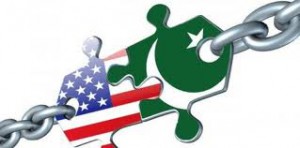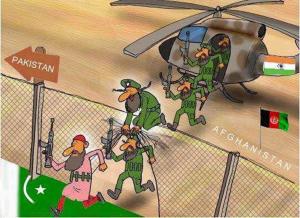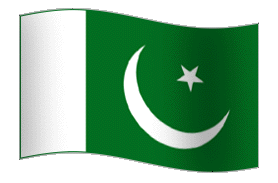Pakistan – US Relations
K.Hussan Zia

To understand a country one has to really know the ethos of its people. This is not always easy for someone who is not a part of the culture. The inability to understand often leads to poor judgement and miscalculation. Just to give one example, a joint US National Intelligence Council and CIA report released in 2000 predicted: “by year 2015 Pakistan would be a failed state, ripe with civil war, bloodshed, inter-provincial rivalries and a struggle for control of its nuclear weapons and complete Talibanisation” (The Times of India, 13th February, 2005). 2015 is almost here but the dire prediction seems nowhere near coming true.
There is much misinformation and many misconceptions about Pakistan. Unfortunately, most of these are negative as well as deeply embedded. There is conceptual and practical confusion that some people think has been fostered deliberately. Human beings tend to sub-consciously erect a defensive wall of cognitive dissonance in such situations. Perceptions are not easily dispelled. The best I hope to do is to explain the facts as I see them and leave the rest to you.
Not Intolerant
There is a general impression that people in Pakistan are bigoted and intolerant. In reality they happen to be anything but that.
Also not Violent
Pakistanis are also not violent. The rate of deaths due to violence per 100,000 people in Pakistan is still less than that in the US (5.0 as against 6.5). It is only a fraction of what it is in almost all of Africa, Latin America (including Mexico) and also Russia. It is about the same as for India and Israel but less than in most of Eastern Europe. (http://www.worldlifeexpectancy.com/cause-of-death/violence/by-country/)
Terrorism
Much is also made of religious extremism and incidents of terrorism in the country. These are not peculiar to Pakistan or the Muslims. Yet, the word ‘terrorism’ has been made more or less synonymous with Muslims which has no basis in fact. According to the list compiled by the FBI for the twenty-five-year period between 1980 and 2005, Muslims were involved in only six per cent of all the terrorist acts committed in the US as against the Jews in seven per cent and Latinos in forty-two per cent. http://www.zerohedge.com/contributed/2013-05-01/non-muslims-carried-out-more-90-all-terrorist-attacks-us-soil
The European Union’s Terrorism Situation and Trend Report for 2010 indicates that out of a total of 294 ‘failed, foiled or successfully executed’ terrorist attacks in Europe in 2009 only one was by Muslim extremists. As against two by the group opposed to the importation of wines from North Africa (article by Dan Gardener in The Ottawa Citizen of 5th January 2011).
Extremists are found in any religion be it Christianity, Judaism or Hinduism. The same is true for acts of terrorism but the two, that is, religious extremism and terrorism are not synonymous (The Battle for God, by Karen Armstrong). IRA in Northern Ireland, ETA in Spain, Shining Path Guerillas in South America, Naxallites, Nagas, ULFA, NDFB, the Khalistan Army to name a few in India, Tamil Tigers in Sri Lanka, FLQ in Canada —- are not Muslims. (Dying to Win, by Robert Pape, University of Chicago).
There was no terrorism in Pakistan to speak of until General Musharraf, under pressure from the US, broke longstanding agreements with the tribesmen and sent troops into Waziristan to hunt down Taliban escaping from Afghanistan. The force used was excessive, inappropriate and unlawful. It is the basic cause of terrorism in Pakistan today (The Thistle and the Drone, by Akbar S. Ahmed).
Taking advantage of the situation, some other actors have jumped into the fray using Afghanistan as their base. India, for instance, has about one million people of Indian origin living in the United Kingdom and she needs only two consulates to look after their needs. On the other hand in Afghanistan, where there are only 3,600 or so Indian nationals, she now maintains seven consulates, most of these in towns along Pakistan’s border. They are widely believed to be involved in supporting terrorism inside Pakistan.
Similarly, CIA memos reveal that in 2007 and 2008 Israeli agents posed as American spies and recruited men to work for the terrorist outfit Jundallah in Pakistan to carry out false flag operations against Iran (‘False Flag’, by Mark Perry, foreignpolicy.com, 13 January 2012).
US – Pakistan Relations
Coming to the US-Pakistan relations; political co-operation between the US and Pakistan has been primarily determined by the needs and policies of the US. This is not to say that Pakistan gained nothing from it; only that she has almost always done what she has been told to do, sometimes even at the expense of her own best interest.
In 1974, India decided to go nuclear leaving Pakistan with little option but to follow suit, much to the annoyance of the US. It remains a serious issue between the two countries. Most Pakistanis are convinced that removal of this capability will always remain the principal objective of the West in Pakistan. It is the primary reason for the trust deficit that exists between the two countries (See Douglas Jehl’s review of the book ‘Lawless World’ in theNY Times of 14th October 2005).
New World Order
The collapse of the Soviet Union left the US as the only super power in the world. Many a strategist scrambled to find a new role for her. One of the first among them was Zbigniew Brzezinski who in his book, The Grand Chessboard hypothesized that any power looking to dominate the world needed control over the Euro-Asian land mass.
This was followed shortly afterwards by Samuel Huntington’s ‘The Clash of Civilizations and the Remaking of World Order’. His thesis about ‘civilization’, meaning race and religion, forming the basis of future conflict in the world was not entirely convincing, nonetheless, it received inordinate amount of publicity.
To some it appeared as if the West was now in search of a new common threat to replace the one posed by the erstwhile Soviet Union. This would hopefully prevent the western nations from turning against each other, as has so often happened in history.
A 1992 US Department of Defence report under envisioned the United States as a colossus astride the world, imposing its will and keeping world peace through military and economic power. It drew too much criticism at the time and was withdrawn shortly afterwards. The issue was revived in 2000 under the name ‘Project for New American Century’.
President Bush apparently went along with its recommendations as reflected in his 2002 National Security Strategy Report. It envisaged permanent U.S. military and economic domination of every region on the globe, unfettered by international treaty or concern. Among other things the US also embraced the right to pre-emptive attacks against perceived enemies (see Gen. Wesley Clark interview with Amy Goodman on ‘Democracy Now’:http://www.democracynow.org/shows/2007/3/2).
Aftermath of 9/11
The attacks on 9/11 created understandable anger and calls for revenge and retribution for the atrocity. According to Bob Woodward in his book ‘Bush at War’, the President was intent on invading Iraq but the Secretary of State, Colin Powell suggested it should be Afghanistan because she was more ‘doable’. Ironically, there was neither any Iraqi nor Afghani among the alleged hijackers.
More bombs were dropped on Afghanistan than had been during the entire World War II. Significantly, on 31st January 2002, even before the bombs had stopped falling, the US Government announced it would support the construction of an oil pipeline across Afghanistan into Pakistan. A month later, Pakistan’s Musharraf signed an agreement with Hamid Karzai to build an oil and gas pipeline from the Caspian Sea basin to a port in Pakistan.
General Musharraf, who had previously staged a coup to overthrow an elected government, did everything he was told. It included provision of naval and air bases to NATO, opening land and air routes to Afghanistan, deploying 60,000 Pakistani troops along the border, apprehending and handing over to the US, without due process, any fighters escaping from Afghanistan; providing long-term logistic support and invaluable intelligence. In the first year alone, the US Central Command made a total of 2,160 demands and Pakistan acceded to each and every one of them. http://www.centcom.mil/Operations/Coalition/Coalition_pages/pakistan.html.
In the process Pakistan’s economy suffered major losses, to the tune of over 10 billion dollars in just the first year alone. This does not include the military expenditure and wear and tear of infrastructure, etc. The total loss that Pakistan’s economy has suffered until now exceeds 200 billion dollars. She has also lost more soldiers in this war than all the NATO countries put together.
We don’t hear any of this from the politicians or media in the West; the talk is only about the 20 billion dollars given in ‘aid’ over a period of twelve years which includes re-imbursements for the cost of logistic supplies provided by Pakistan to NATO troops in Afghanistan.
Drone Attacks
The surgical nature and pinpoint accuracy claimed for these operations is a myth. So is the claim that it is only the terrorists who are targeted. In an article on Facebook entitled ‘Are We at War With Pakistan?’ Congressman and at one time presidential hopeful, Ron Paul writes, ‘former US ambassador to Pakistan, Cameron Munter, when asked to define who can be targeted by the drones, said: ‘The definition is a male between the ages of 20 and 40’. (http://www.facebook.com/ronpaul/posts/10152361365996686 and
Colonel Kilcullen, who has served as adviser to General Petraeus in both Afghanistan and Iraq, estimates the kill ratio of innocent civilians and terrorists is more like 50 to 1 (‘Death From Above, Outrage Down Below’ The New York Times. 16th May 2009). The Peshawar High Court in its judgement on a case about the drones put it closer to zero per cent.
Imagine having up to six drones circling overhead twenty-four hours a day, not for a day or a week or a month but for years on end, making a constant buzzing sound that never ceases. Anyone listening to it knows that it can bring death and destruction to anyone at any time. It creates a deep-seated psychological fear —- a sort of unending emotional torture for all the inhabitants.
The lives of people in the area have changed completely. Children aged five to ten no longer go to school. Men are afraid to gather in groups of more than two or three. Weddings, which used to be such joyous affairs with music, dancing, and drumming, are now subdued events with only close family members present. Since funerals have also been targeted by the drones, they are now small gatherings as well.
It has not made the US any safer. The children of those killed in Waziristan are and will continue looking for Americans, wherever they can find them, to avenge the killing of their kith and kin for a very long time, indeed for generations to come. The tribal law, Pakhtoonwali, more or less makes it obligatory for the descendants of anyone killed to seek revenge from the offending party. It is known as badal or badla —- you kill one of mine, I will kill one of yours —- and there is no time limit on it (‘Living Under Drones: Death, Injury and Trauma to Civilians From US Drone Practices inPakistan’, NYU School of Law and Stanford University Law School) .
This is not all by any means. Eleven and twelve year old boys and men well in their seventies, including even a ninety-year-old, as well as Afghanistan’s ambassador to Pakistan, were incarcerated and tortured at Bagram, Guantanamo and other places. There were no charges laid against them. To the outside world it gave the impression of hubris and contempt for the feelings of others and humanity itself.
On the night of 25–26 November 2010, US helicopter gunships attacked two army posts well inside Pakistan without any provocation. The attack lasted almost two hours and stopped only after all but two of her soldiers had been killed. To make matters worse, for a long time the US even refused to apologise for the atrocity.
Two months later a Blackwater mercenary working for the CIA shot and killed two Pakistanis on a busy road in Lahore and fled the scene as hundreds of people watched. President Obama even claimed diplomatic immunity for him which he did not have. There was uproar in Pakistan as was to be expected.
Not Doing Enough
Ever since she invaded Afghanistan the US has accused Pakistan of not doing enough to stop infiltration by Taliban, which is a euphemism for the Pashtoon or Pathans who are resisting the occupation.
It is next to impossible for Pakistan to stop the volunteers given the nature of the terrain, the familial connection between the people on either side of the border and their commitment to each other. There are also three and a half million Afghan refugees who have not gone back since the Soviet invasion. They are even more committed to the liberation of their country.
NATO had 100,000 plus troops who had done very little to secure the border on their side which makes any criticism of Pakistan disingenuous. The general feeling in Pakistan is that the US was trying to make her a scapegoat for what is now generally accepted as an impending debacle.
If the West has an interest in Central Asia it is a mistake to have an adversarial relationship with Pakistan. Realistically, the West can only have access to the Central Asian resources either through Iran or Pakistan. It needs both of these just in case one becomes unavailable for some reason. It is in the interest of the West to exercise caution in relations with both these nations.
Conclusion
Terrorism kills only a fraction of the people every year than are killed in accidents on the roads. Wars against terrorism, on the other hand have killed millions and climate change threatens to kill many times more. So why are we ignoring climate change by giving it benefit of the doubt which isn’t there and destroying entire societies and countries in the name of fighting terrorism —- worse still, accumulating trillions of dollars in debt in the process?
There is plenty of evidence to suggest that these wars have only created enemies where none need to exist. Dealing with the causes that led to terrorism in the first place, would have been much more effective and advisable. If only a part of the three trillion dollars that have been blown away so far on the ‘wars on terrorism’ had been used to better the lot of humanity, the world would be a far more peaceful and prosperous place for everyone to live in. As an example, only one per cent of it ($ 30 bn.) was enough to put an end to world hunger.
The United States is a great country, perhaps the greatest the world has ever seen. So much good was expected of her. What she has done especially since the turn of this century has not made the world a safer or better place. One can only hope that things will soon change and she will use her tremendous potential for the benefit of humanity and the future of mankind as a whole and not be seen to serve the interests of a selected few.
The writer is author of the books, ‘Pakistan: Roots, Perspective and Genesis’ and ‘Muslims and the West: A Muslim Perspective’. This article is an extract from the keynote address delivered by him at a conference on US – Pakistan relations held in the United States in July this year.










